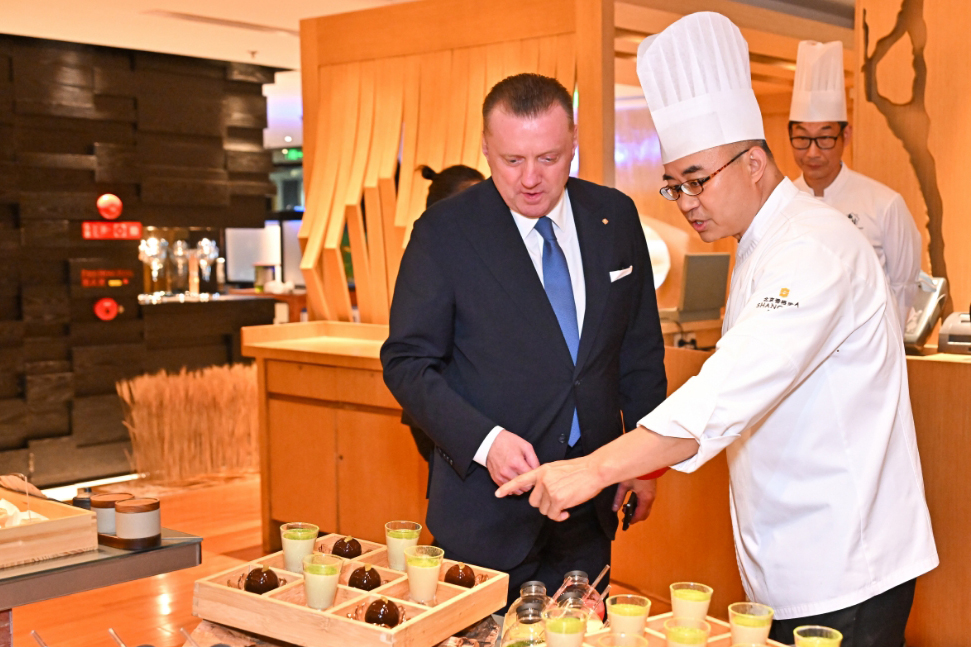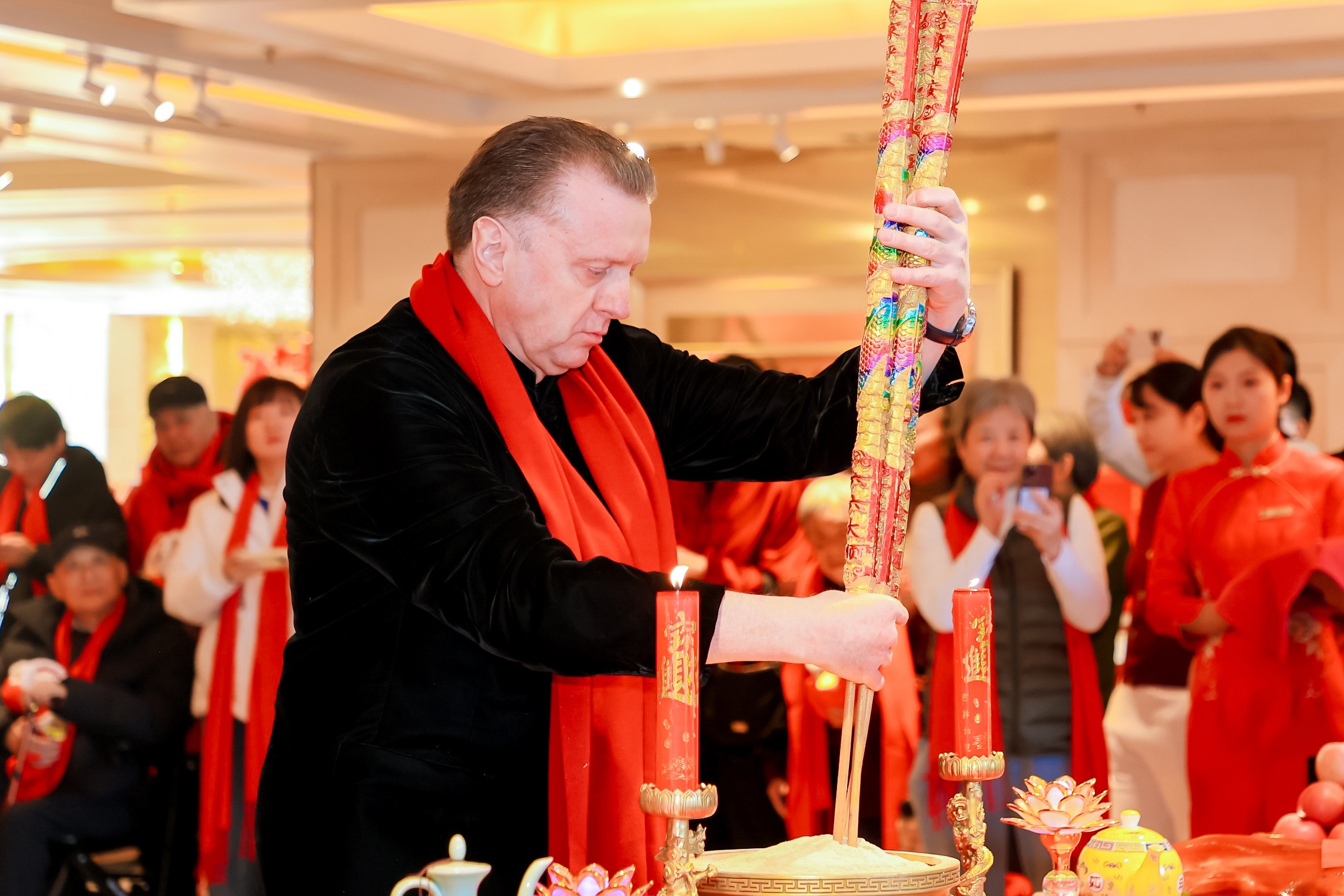
Swiss hotel manager commits to China for the long haul

Ticino native Carlo Schmed has lived for 37 years in China. A son of Swiss hoteliers, he decided to follow in the family footsteps – not in Switzerland but in the Far East, where he has managed hotels since 1987.
As the sliding doors open, a stylish-looking man in a dark suit and a blue tie awaits in the middle of the lobby. It is the general manager of the Hotel Shangri-La in Beijing, Ticino native Carlo Schmed.

Hospitality and welcoming are in his DNA. His parents ran a hotel in Ticino. Schmed grew up in the hotel environment, and has spent his whole adult life navigating this world too.
He is originally from Ponte Brolla, in Vallemaggia. After attending hotel school, he left Switzerland for a job in Cairo. But a desire to see the world inspired him to look further east.
“I had read that in Asia the hotel sector was more advanced, at a higher level. To get ahead in my career, it would be good for me to get some experience in one of those five-star hotels in Asia,” he explains. Having been hired by the Peninsula hotel group, he arrived for the first time in Beijing, the Chinese capital, in October 1987.
A rapidly-developing country
In the late 1980s, as Schmed stepped off the plane into a vastly different China, he was greeted by a bustling tapestry of cyclists navigating the narrow streets, a stark contrast to the vehicle-clogged thoroughfares of today.
Hong Kong at the time was an obligatory stopover to get to China. But after the tragic events of Tiananmen Square, everything started to change, ushering in a wave of transformation that would soon include direct flights to and from Europe.
The Swiss Abroad are as diverse as the countries in which they live. SWI swissinfo.ch wants to showcase this diversity and is therefore publishing an exciting personal life story from a Swiss Abroad every month.
“What really impressed me was the sheer pace of development, and I was a part of that development,” he says.
That pace of change in China sharply differs from the realities of rural Switzerland. He still retains a sense of belonging when visiting his village in Ticino but eventually gets restless.
“I start to miss the traffic, the people, the efficiency of the Chinese apps,” he says. “I haven’t used cash for five years now! There is always movement in Beijing. In my home village all is calm and quiet, and I feel the remoteness of it. Here you are never alone, always surrounded by crowds of people.”
Swiss hospitality meets China
Schmed values direct contact with his guests. He credits that to his parents and the way they run their hotel.
“In Ticino, my parents were always dealing with their customers – they talked to them and they knew their habits,” he shares. “That’s how you establish a relationship of trust. I grew up with that attitude where you talk to guests, know about their habits, find out when they will be coming back. Today competition is tough, and customers have plenty of choice. They’ll go where they know the chef, the director, the staff.”
In the hotel sector China has made giant leaps, and international hotel groups are now seeing plenty of competition from the Chinese themselves. Schmed explains that when he first came to the country, many of the hotel managers and chefs were foreigners, but today that is no longer the case. Now, in hotels in China, the managers, staff and chefs are almost all Chinese.

After his initial stint in Beijing, Schmed worked in other cities like Hong Kong, Chengdu, Chongqing and Canton. The Shangri-La in Beijing now boasts a staff of 750, and as part of day-to-day operations the general manager interfaces with his 15 department managers.
“Professionally, these are great workers, they don’t stop till they’ve got the job done,” he says. “They are passionately dedicated to their work.”
Furthermore, he notes, managing a business in Asia is much simpler than in Europe or the US, especially when it comes to the bureaucratic and administrative side of things.
Chinese more open to foreigners
Chinese culture is also evolving. The younger generation is welcoming and eager to connect with people from different backgrounds and cultures – unlike older generations.
“At the start I found it hard to make friends. People were rather distant. Today there is more openness, and it is easier to make friends here. I have a number of Chinese friends. They invite me to their homes or we go out for dinner together. There are no longer barriers,” he says.

Schmed is himself a dynamic person. He likes to travel and immerse himself in new experiences. “With these friends I have I like to try out new restaurants and bars. I go to the old part of the city, and in summer we have picnics and barbecues at the Great Wall. I like to see new things and pick up new ideas I may be able to use in my own hotel.”
What has kept Schmed in China all this time is the rapid pace of change and the dynamic nature of the country. But also the sense of security, and the cuisine, which is varied and rich. The varied geography of the country has inspired him too.
“In China there are mountains, sea, culture, great cities,” he says. “You can do whatever you want. Then there are the costs too – even with a modest budget you can do a lot. You can go out for dinner every evening. Everything is accessible and available online.”
Schmed finds he has adapted completely to the Asian lifestyle and just couldn’t do without all the services available to him at a local level.
The right choice
The hotelier from Switzerland does miss old friends, seasonal specialty foods, the starry sky, nature and invigorating hikes. Distances are another factor.
“In Switzerland you don’t have to travel far to see different places and taste different cuisine. Here you can drive for hours and you’re still in the same city,” he chuckles.
Of his own family, he still has his mother, and they talk on the phone every day. During his years in China he has never had a hankering to return to Switzerland. But when he retires, he says, he would like to divide his time between two homes – one in Switzerland and one in Thailand.
Before we say goodbye, Schmed goes to the window of his office overlooking the inner courtyard of the hotel, where fine buildings recall the architecture of the nearby Summer Palace, the historic residence of the Chinese emperors.
“What would I have done if I had stayed at home in Switzerland? I wonder myself sometimes,” he says. “I wouldn’t have had all these marvellous experiences. I am really very happy with the choice I made.”
How are you and what is on your mind? Let us know in our 2025 survey:

More
How are you, Switzerland? Let us know in our 2025 survey
Adapted from Italian by Terence MacNamee/ds

In compliance with the JTI standards
More: SWI swissinfo.ch certified by the Journalism Trust Initiative



























You can find an overview of ongoing debates with our journalists here . Please join us!
If you want to start a conversation about a topic raised in this article or want to report factual errors, email us at english@swissinfo.ch.